
Eugene Luther Gore Vidal was an American writer and public intellectual known for his acerbic epigrammatic wit. His novels and essays interrogated the social and sexual norms he perceived as driving American life. Vidal was heavily involved in politics, and unsuccessfully sought office twice as a Democratic Party candidate, first in 1960 to the United States House of Representatives, and later in 1982 to the United States Senate.

Burr: A Novel is a 1973 historical novel by Gore Vidal that challenges the traditional Founding Fathers iconography of United States history, by means of a narrative that includes a fictional memoir by Aaron Burr, in representing the people, politics, and events of the U.S. in the early 19th century. It was a finalist for the National Book Award in 1974.
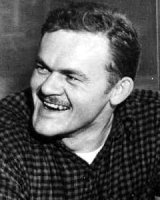
James Ramon Jones was an American novelist renowned for his explorations of World War II and its aftermath. He won the 1952 National Book Award for his debut novel, From Here to Eternity, which was adapted for film a year later and made into a television series a generation later.
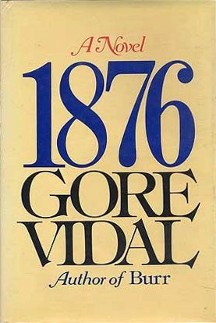
1876 is the third historical novel in Gore Vidal's Narratives of Empire series. It was published in 1976 and details the events of a year described by Vidal as "probably the low point in our republic's history".
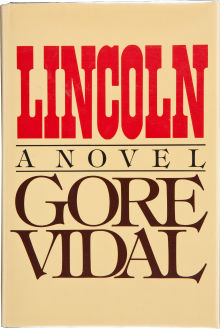
Lincoln: A Novel is a 1984 historical novel, part of the Narratives of Empire series by Gore Vidal. The novel describes the presidency of Abraham Lincoln and extends from the start of the American Civil War until his assassination. Rather than focus on the Civil War itself, the novel is centred on Lincoln's political and personal struggles. Though Lincoln is the focus, the book is never narrated from his point of view ; Vidal instead writes from the perspective of key historical figures. He draws from contemporary diaries, memoirs, letters, newspaper accounts, the biographical writings of John Hay and John Nicolay, and the work of modern historians.
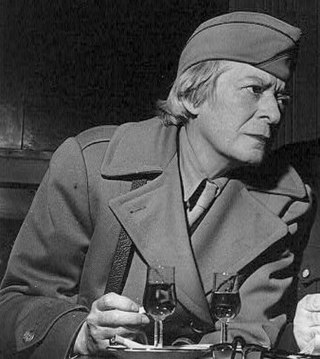
Janet Flanner was an American writer and pioneering narrative journalist who served as the Paris correspondent of The New Yorker magazine from 1925 until she retired in 1975. She wrote under the pen name "Genêt". She also published a single novel, The Cubical City, set in New York City.

Burr Gore Steers is an American actor, screenwriter, and director. His films include Igby Goes Down (2002) and 17 Again (2009). He is a nephew of writer Gore Vidal.

Empire is the fourth historical novel in the Narratives of Empire series by Gore Vidal, published in 1987.

Jay Parini is an American writer and academic. He is known for novels, poetry, biography, screenplays and criticism. He has published novels about Leo Tolstoy, Walter Benjamin, Paul the Apostle, and Herman Melville.
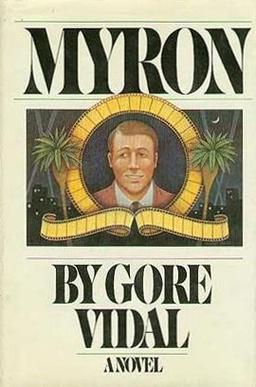
Myron is a novel by American author Gore Vidal, published in 1974. It was written as a sequel to his 1968 bestseller Myra Breckinridge. The novel was published shortly after an anti-pornography ruling by the Supreme Court; Vidal responded by replacing the profanity in his novel with the names of the Justices involved
Lucinda Ebersole was a critic, editor and writer of fiction in the literary scene of Washington, D.C. She is best known for her association with the literary journal Gargoyle Magazine, for which she was co-editor along with Richard Peabody from 1997 to 2017. She also edited various anthologies with Peabody, most notably the various books in their Mondo series. She also wrote an unpublished book entitled Málaga, which she described in 1998 as "a really weird little novel that is sort of 'transgendered' kind of poetry, kind of a novel."
Modern Library's 100 Best Novels is a 1998 list of the best English-language novels published during the 20th century, as selected by Modern Library from among 400 novels published by Random House, which owns Modern Library. The purpose of the list was to "bring the Modern Library to public attention" and stimulate sales of its books. A separate Modern Library 100 Best Nonfiction list of the 100 best non-fiction books of the 20th century was created the same year.

The Golden Age, a historical novel published in 2000 by Gore Vidal, is the seventh and final novel in his Narratives of Empire series.

Live from Golgotha is a novel by Gore Vidal, an irreverent spoof of the New Testament. Told from the perspective of Saint Timothy as he travels with Saint Paul, the 1992 novel's narrative shifts in time as Timothy and Paul combat a mysterious hacker from the future who is deleting all traces of Christianity.

Couples is a 1968 novel by American author John Updike.

Duluth is a 1983 novel by Gore Vidal. He considered it one of his best works, as did Italo Calvino, who wrote, "Vidal's development...along that line from Myra Breckinridge to Duluth, is crowned with great success, not only for the density of comic effects, each one filled with meaning, not only for the craftsmanship in construction, put together like a clock-work which fears no word processor, but because this latest book holds its own built-in theory, that which the author calls 'après post-structuralism'. I consider Vidal to be a master of that new form which is taking shape in world literature and which we may call the hyper-novel or the novel elevated to the square or the cube."

Hollywood is the fifth historical novel in Gore Vidal's Narratives of Empire series. Published in 1990, it brings back the fictional Caroline Sanford, Blaise Sanford and James Burden Day and the real Theodore Roosevelt and William Randolph Hearst from Empire. Events are seen through the eyes of the Sanfords, Day, and the historical Jess Smith, a member of the Ohio Gang.
The Narratives of Empire series is a heptalogy of historical novels by American author Gore Vidal, published between 1967 and 2000, which chronicle the dawn-to-decadence history of the "American Empire"; the narratives interweave the personal stories of two families with the personages and events of U.S. history. Despite the publisher's preference for the politically neutral series-title "American Chronicles", Vidal preferred the series title "Narratives of Empire". The seven novels can be read in either historical or publication order without losing narrative intelligibility.

Dark Green, Bright Red is a novel by Gore Vidal, concerning a revolution headed by a former military dictator in an unnamed Central American republic. The book was first published in 1950 in the United States by E. P. Dutton. It drew upon Vidal's experiences living in Guatemala during the Guatemalan Revolution.
Nina Gore Auchincloss Straight is an American author, journalist, and socialite. She is the mother of writer/director Burr Steers and artist Hugh Auchincloss Steers, half-sister of Gore Vidal, step-sister of First Lady Jacqueline Onassis and socialite Princess Lee Radziwill.














